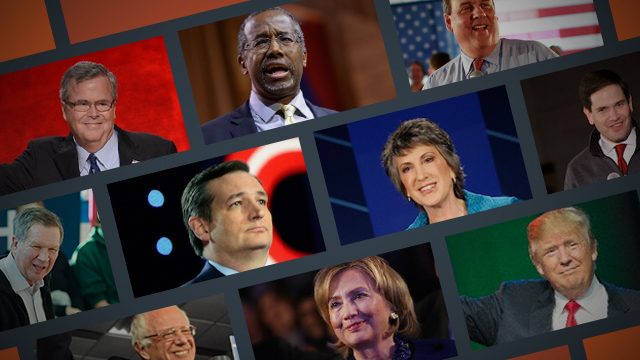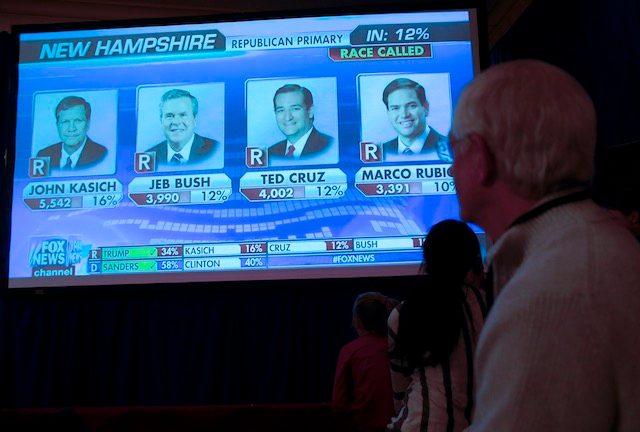SUMMARY
This is AI generated summarization, which may have errors. For context, always refer to the full article.

This compilation was migrated from our archives
Visit the archived version to read the full article.
WASHINGTON DC, USA – In July, Hillary Clinton offered up some prophetic words.
“I always thought this would be a competitive race,” she told CNN.
How right she was. Her rival Bernie Sanders ran away with the Democratic presidential primary in New Hampshire, besting Clinton by more than 20 percentage points.
On the Republican side, Donald Trump earned his first win of the campaign, and none of his rivals were even close.
What does it all mean? Here are the top takeaways from Tuesday’s (February 9) primary in the Granite State, only the second stop on the long road to the White House.
Trump 1, Establishment 0
The first lesson is not to be hasty in drawing conclusions from the campaign trail.
It’s clear that Trump was unable to fully muster supporters last week in Iowa, when he finished second to ultra-conservative Senator Ted Cruz.
But he made good Tuesday on the resounding overall lead he has enjoyed in opinion polls since last summer, earning more than a third of Republican votes in New Hampshire.
“People read a lot into Trump’s performance in Iowa,” said Robert Boatright, a professor of political science at Clark University in Massachusetts.
The anti-establishment, anti-elite message of the billionaire tycoon resonates with an eclectic mix of voters – from the center to the far right – whose unifying characteristic is the rejection of politics as usual.
Unless evidence surfaces to the contrary, those voters have not abandoned their chosen candidate.
Trump’s rivals are many – 4 of them earned at least 10% of the vote on Tuesday: Ohio Governor John Kasich, former Florida governor Jeb Bush, Senator Marco Rubio of Florida and Cruz, the hero of the religious right.
“The Republican leadership wanted the field of non-Cruz and non-Trump candidates to be reduced,” said Kyle Kondik, managing editor of the University of Virginia’s online political newsletter Sabato’s Crystal Ball.
“The winnowing didn’t really happen tonight.”
Jeb Bush: Stayin’ Alive
Bush, who is looking to follow in the footsteps of his president father and brother, spent last week insisting over and over again that New Hampshire was not a do-or-die moment for his campaign.
With roughly 11% of the vote on Tuesday, Bush – headed for a fourth-place finish – is still alive.

New Hampshire “revives his campaign to a certain degree – it shows that he has at least as much support as Rubio and Cruz in a primary state,” said Steven Smith, a professor of political science at Washington University in St Louis.
“He also probably has a larger bank account than Kasich and Rubio at this stage. So he will be in a position to put on full-scale campaigns in South Carolina and Nevada” later this month, Smith said.
What next for Rubio?
Rubio – the surprise third-place finisher in Iowa – looked headed for fifth place in New Hampshire, largely due to a robotic debate performance on Saturday, February 6, that didn’t impress voters in the northeastern US state.
“Maybe Rubio was a little overvalued after Iowa – now he’s probably going to be undervalued after New Hampshire,” Kondik predicted.
Rubio, in a campaign message to supporters hours after the New Hampshire polls closed, admitted: “On Saturday night at the debate, I dropped the ball. I want you to know that will never happen again.”
Clinton banking on black voters
After Tuesday’s loss, Clinton’s team quickly tried to downplay its significance by turning to the numbers.
“The nomination will very likely be won in March, not February,” campaign manager Robby Mook said in a memo sent to reporters.
Voters in 28 states will cast ballots in March, with more than half of the delegates to the Democratic National Convention at stake.

Notably on the calendar are contests in South Carolina, Texas, Georgia and Alabama, where black and Hispanics make up a majority of the Democratic voters.
Since the presidency of Clinton’s husband Bill in the 1990s, the links between the Clintons and blacks have been nearly airtight, with the exception of Barack Obama’s historic 2008 run – at Hillary’s expense.
“Before the primaries, you could make the argument that Iowa and New Hampshire were two of Bernie Sanders’ three best states because they’re very liberal and they’re very white, Vermont being the third state,” Kondik said.
Clinton’s national profile may suffer after the loss in New Hampshire, Kondik said, but Sanders’ lack of popularity in the South is borne out by several polls. According to an NBC survey, he trails Clinton in South Carolina by 37 percentage points.
The question of course is: Will African-American voters stay loyal to Clinton?
“It will be very difficult, if not impossible, for a Democrat to win the nomination without strong levels of support among African-American and Hispanic voters,” Mook said.
The math
So far, only 2% of the Democratic and Republican delegates on offer have been awarded in Iowa and New Hampshire.
As long as the Republican race remains divided, Trump can continue to dominate, even without winning 50% of the vote.
But, from March 15, many states will begin attributing all of their Republican delegates on a winner-takes-all basis, and not proportionally, as the Democrats do. – Ivan Couronne, AFP / Rappler.com
Add a comment
How does this make you feel?
There are no comments yet. Add your comment to start the conversation.